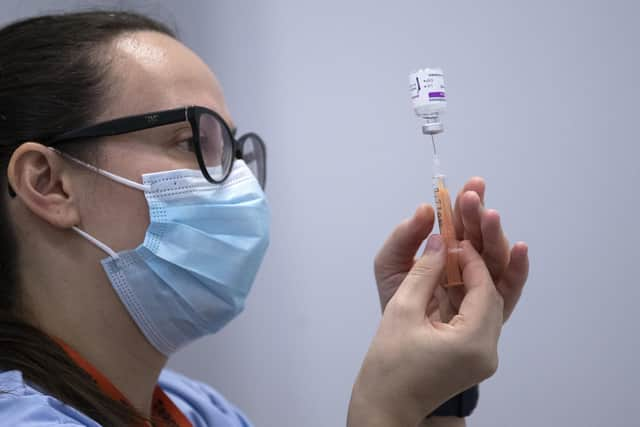Covid Scotland: Vaccine passports not a 'golden bullet' and may 'come back to haunt us', MSPs told
The comments come a week before the Scottish Government is set to introduce a vaccine certification scheme for nightclubs and larger events including football games.
However, giving evidence to MSPs at Holyrood’s Covid-19 recovery committee on Thursday, experts warned Nicola Sturgeon’s administration was yet to make the case for their introduction given their impact on human rights.
Advertisement
Hide AdAdvertisement
Hide Ad

Professor Sir Jonathan Montgomery, of the Ada Lovelace Institute, told MSPs the scheme was unlikely to be a “golden bullet” for releasing pressure on the NHS.
He said it was not clear whether it would reduce vaccine hesitancy, stating: "My worry about vaccine passporting is that it doesn’t really address the reasons why people are hesitant.
"There is an understandable distrust amongst those communities who feel that they are neglected by society, who experience more heavy-handed policing, greater surveillance amongst their communities, and if you move to a passporting system, it essentially may be reinforcing their sense of not being taken, not being respected and having their needs taken seriously.
"I think what you worry about with vaccine passports is that instead of seeking to address the reasons for distrust and concern, you aim to up the stakes for people and say if you want to enter these things, you have to be vaccinated, and that may exacerbate distrust and come back to haunt us.
“I think it would be wrong to see this as a golden bullet, and that’s one of the things that we were concerned about … that people thought that somehow vaccine passports were the thing that would solve the problem [of NHS pressure].”
Judith Robertson of the Scottish Human Rights Commission criticised the fact the evidence for the implementation of the vaccine certification was yet to be made public.
She told MSPs: “From our perspective that case has not been made at the moment or if it has, it is not in the public domain and that is one of the key aspects in relation to those human rights considerations that the evidence upon which decisions are being made, be placed into the public domain, so that not only the basis on which decisions are being made is clear, but that can be interrogated by a wider element of the population.
"There isn’t a clarity around what evidence is being used to base the decisions at the moment and … what we haven’t seen is any evidence that there has been any engagement with the people most likely to be impacted on by this decision.
Advertisement
Hide AdAdvertisement
Hide Ad"A certification scheme has much more of a feel of coercion and really walks into that territory and it is not clear to me why the government has taken a shift away from its very publicly declared stance on encouragement into something which has a very different feel to it.”
This was echoed by Prof Montgomery, who said: “We don’t really have very good evidence about how people respond to certification requirements.
"The case has not been articulated in the ways I would look for. I would be nervous to say it couldn’t be articulated, but I haven’t seen that set out as yet.”
A message from the Editor:
Thank you for reading this article. We're more reliant on your support than ever as the shift in consumer habits brought about by coronavirus impacts our advertisers.
If you haven't already, please consider supporting our trusted, fact-checked journalism by taking out a digital subscription.
Comments
Want to join the conversation? Please or to comment on this article.
